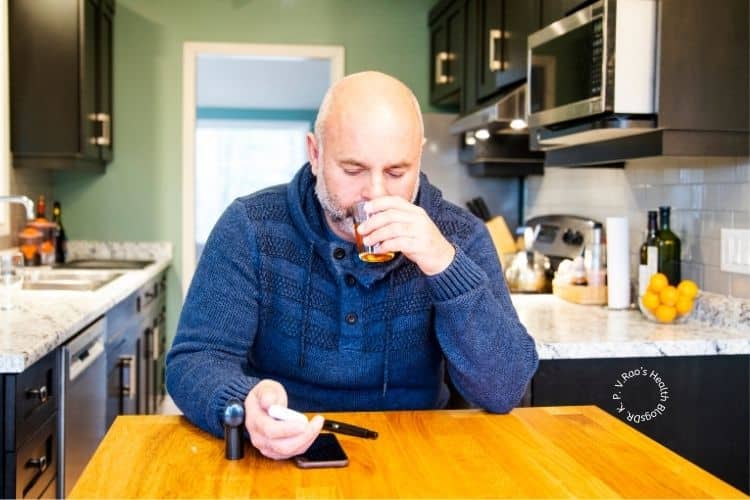If you have diabetes, the question of whether or not to drink alcohol can be a tricky one. While alcohol can have some potential benefits, it also comes with its fair share of drawbacks. Let’s explore the pros and cons of drinking alcohol in diabetes.
Table of Contents
Pros and Cons of drinking alcohol in diabetes
Here are some research views on advantages and disadvantages of drinking alcohol in diabetes:
Pros of Drinking Alcohol in Diabetes
- Moderate alcohol consumption may have a potential positive impact on cardiovascular health.
- Some studies suggest that moderate alcohol intake can increase insulin sensitivity.
- Certain types of alcohol, like red wine, may contain antioxidants that can help reduce inflammation.
Cons of Drinking Alcohol in Diabetes
- Alcohol can lower blood sugar levels, leading to hypoglycemia if not properly managed.
- Excessive alcohol consumption can contribute to weight gain and increase the risk of obesity-related complications.
- Alcohol can interact with diabetes medications, potentially causing adverse effects or interfering with their efficacy.
- Heavy alcohol consumption can lead to liver damage and exacerbate existing diabetes-related complications.
- Alcohol can impair judgment and decision-making, potentially leading to poor self-management of diabetes.
- Alcohol contains calories but provides limited nutritional value, which can hinder overall diabetes management.
- Excessive alcohol intake can increase the risk of developing other chronic health conditions, such as high blood pressure or certain cancers.
* Please note that it’s always important to consult with a healthcare professional for personalized advice regarding alcohol consumption and diabetes management.
What do research tell us about drinking alcohol in diabetes?
On the positive side, moderate alcohol consumption may have some cardiovascular benefits for individuals with diabetes.
Research suggests that moderate drinking can increase levels of HDL cholesterol, the “good” cholesterol that helps protect against heart disease.
Additionally, certain types of alcoholic beverages, such as red wine, contain antioxidants that can help reduce inflammation and improve insulin sensitivity.

However, it’s important to note that alcohol can also have negative effects on blood sugar control. Drinking alcohol can cause blood sugar levels to either rise or fall, depending on various factors such as the type and quantity of alcohol consumed.
Excess alcohol can decrease blood sugar levels, which can be especially dangerous for individuals with type 1 diabetes who are already at risk for hypoglycemia. On the other hand, beer and sweet wine can raise blood sugar levels due to their carbohydrate content.
Another concern is the impact of alcohol on weight management. Alcoholic drinks are high in empty calories and can contribute to weight gain, making it more difficult to achieve and maintain a healthy weight.
Additionally, alcohol stimulates appetite and can lead to overeating or making poor food choices, which can further disrupt blood sugar control.
Furthermore, alcohol can interact with diabetes medications or insulin, affecting their effectiveness. It can also increase triglyceride levels and blood pressure, both of which are risk factors for cardiovascular disease. Moreover, alcohol consumption can cause symptoms that mask low blood sugar, making it harder to recognize and treat hypoglycemia.
Given these potential risks, it is crucial for individuals with diabetes to consult with their doctor before consuming alcohol.
The amount of alcohol that is safe to drink will depend on an individual’s health condition and overall management of their diabetes.
In general, guidelines recommend limiting alcohol consumption to two drinks per day for men and one drink per day for women. It is also advised to drink alcohol only with food, drink slowly, avoid sugary mixed drinks, and wear a medical alert jewelry indicating diabetes.
FAQ
Here are some frequently asked questions by most of my diabetic patients regarding having alcohol when on diabetic medications:
Q: Can you drink alcohol if you have diabetes?
A: Yes, but it’s important to do so in moderation and with caution.
Q: Does alcohol increase blood sugar?
A: No, alcohol itself does not directly raise blood sugar levels.
Q: Does alcohol spike insulin?
A: No, alcohol does not cause a significant spike in insulin levels.
Q: Why does alcohol cause hypoglycemia in diabetes?
A: Alcohol can lower blood sugar levels, leading to hypoglycemia, especially if consumed without food or in excessive amounts.
Your liver will choose to metabolize the alcohol over maintaining your blood glucose, which can lead to hypoglycemia. The liver often makes this choice when you drink without eating food—so consider snacking while you sip.
American Diabetes Association
Conclusion
In conclusion, while there may be some potential benefits associated with moderate alcohol consumption for individuals with diabetes, caution should be exercised. It is important to consider the potential risks and how they may interact with your specific situation.
Ultimately, consulting with your healthcare provider is the best way to determine if drinking alcohol is safe for you and how it should be incorporated into your diabetes management plan.
Alcohol and diabetes- link
Useful article: Diet in diabetes

